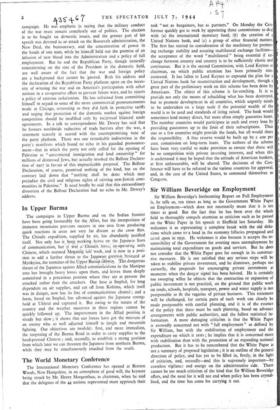Sir William Beveridge on Employment
Sir William Beveridge's forthcoming Report on Full Employment is, he tells us, ten times as long as the Government White Paper on Employment—which does not necessarily mean that it is ten times as good. But the fact that he has been over the whole field so thoroughly compels attention to criticism such as he passed on the White Paper in his speech at Sheffield last Saturday. He welcomes it as representing a complete break with the old delu- sions which came to-a head in the economy fallacies propagated and c.cted opon in 1931. He welcomes it also because it accepts the re- spOnsibility of the Government for averting mass unemployment by maintaining total expenditure on goods and services. But he does not consider that the White Paper goes far enough in its construc- tive measures. He is not satisfied that any serious steps will be taken to stabilise private investment, and he dismisses, perhaps too cursorily, the proposals for encouraging private investment at moments when the danger signal has been hoisted. He is certainly too sweeping when he objects that the contraction or expansion of public investment is not practical, on the ground that public work on roads, schools, hospitals, transport, power and water supply is not postponable to fit the vagaries of private business. This statement will be challenged, for certain parts of such work can clearly be made postponable with careful planning, and it is of the essence of the policy that there must be such planning, based on advance arrangements with public authorities, and the fullest statistical in- formation. A more damaging criticism is that the White Paper is avowedly concerned not with " full employment " as defined by Sir William, but with the stabilisation of employment and the expenditure on which it rests ; he implies that it is concerned more with stabilisation than with the promotion of an expanding national production. But it has to be remembered that the White Paper is not a summary of proposed legislation ; it is an outline of the general direction of policy, and has yet to be filled in, firstly, in the light of criticism, and, secondly—and this -is supremely important—by ceaseless vigilance and energy on the administrative side. There cannot be too much criticism of the kind that Sir William Beveridge offers, and the need for it will not end when policy has been crystal- lised, and the time has come for carrying it out


























 Previous page
Previous page